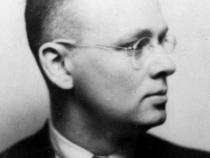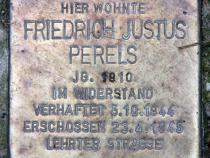Location
Viktoriastr. 4 a
District
Lichterfelde
Stone was laid
07 March 2009
Born
03 November 1910 in Berlin
Excecuted
22 April 1945 in Berlin
Friedrich Justus Perels, born on 13 November 1910 and executed on 23 April 1945, was the second son of the liberal university professor Ernst Perels and his wife Antonie, née Hermes. His parents lived in the parish of St John in Lichterfelde-West, at Weddigenweg 64.
Participation in student bible circles and a close friendship with Martin Niemöller were formative influences on Friedrich Justus Perels as a youth. He enrolled to study law, under Gustav Radbruch in Heidelberg, among others, and acquired “a discriminating, liberal approach to law”, as his son pointed out at a church congress in Hanover in 2005. When the Nazis came to power in 1933, Friedrich Justus Perels “confronted the unbridled power structure … head-on”. Several family members lost their positions at the university for “racial-political” reasons.
On 1 April 1933, Friedrich Justus Perels became a trainee lawyer. He offered his services as a legal advisor to the emergency covenant of pastors (Pfarrernotbund), founded in 1933. On 11 August 1933, he wrote a letter to Martin Niemöller, stating that since “the men who are the Reich leaders (of German Christians) issue theological comments daily that are simply unacceptable for the church of Jesus Christ, … [we have] the task of maintaining a distance to this doctrine, also in formal terms, and communicating the true nature of this attack on the New Testament.”
On completion of his traineeship in 1936, Friedrich Justus Perels became a legal advisor to the Brethren Council of the Prussian Union of churches, succeeding the former regional court judge Friedrich Weissler. Imprisoned in Sachsenhausen in 1936 and murdered in 1937, Weissler is thought to have been the author of a courageous memorandum by the second provisional leadership of the Confessing Church, which was published in the foreign press on 23 July 1936. It condemned the de-Christianization of the German people, the institution of the Gestapo, concentration camps, arbitrary rule and the distortion of justice, and the persecution of Jews and dissidents.
As well as working as a lawyer, Friedrich Justus Perels ran the office of the Confessing Church at Drakestraße 32 in Lichterfelde (which was later destroyed by bombing). “Perels’ road to increasing opposition to the Nazis [adds] a distinctive puzzle piece [to] the picture of life in the Third Reich, not untypical for some Protestant groups, which has hitherto been overlooked in portrayals of Nazism.” (Schreiber, Matthias: Friedrich Justus Perels. Ein Weg von Rechtskampf der Bekennenden Kirche in den politischen Widerstand. Munich 1985, p. 21 [translation: CK]).
In 1940 Friedrich Justus Perels married Helga Kellermann and set up his own practice as a lawyer. The couple’s only son, Joachim, was born in Berlin in 1942. The family lived at Viktoriastraße 4a in Lichterfelde.
Friedrich Justus Perels was close friends with Dietrich Bonhoeffer, and involved in the “U Sieben” action, thanks to which fourteen people managed to escape abroad. In October 1941, he and Dietrich Bonhoeffer submitted a petition to the officers involved in the German resistance against the deportation of Jews.
In the wake of the failed attempt to assassinate Hitler of 20 July 1944, Friedrich Justus Perels was arrested as a conspirator. On 2 February 1945, he was condemned to death by the People’s Court under Roland Freisler. In the night of 22 to 23 April 1945, he was murdered on a bomb site in Lehrter Straße by a shot in the neck.
Due to Friedrich Justus Perels’ involvement in the failed assassination attempt, his father, Prof. Ernst Perels, was sought as a liable member of kin and arrested in October 1944. Initially detained in Moabit prison, he was later sent to Buchenwald, then Flossenbürg, where he died on 10 May 1945, shortly before the camp’s liberation.
Participation in student bible circles and a close friendship with Martin Niemöller were formative influences on Friedrich Justus Perels as a youth. He enrolled to study law, under Gustav Radbruch in Heidelberg, among others, and acquired “a discriminating, liberal approach to law”, as his son pointed out at a church congress in Hanover in 2005. When the Nazis came to power in 1933, Friedrich Justus Perels “confronted the unbridled power structure … head-on”. Several family members lost their positions at the university for “racial-political” reasons.
On 1 April 1933, Friedrich Justus Perels became a trainee lawyer. He offered his services as a legal advisor to the emergency covenant of pastors (Pfarrernotbund), founded in 1933. On 11 August 1933, he wrote a letter to Martin Niemöller, stating that since “the men who are the Reich leaders (of German Christians) issue theological comments daily that are simply unacceptable for the church of Jesus Christ, … [we have] the task of maintaining a distance to this doctrine, also in formal terms, and communicating the true nature of this attack on the New Testament.”
On completion of his traineeship in 1936, Friedrich Justus Perels became a legal advisor to the Brethren Council of the Prussian Union of churches, succeeding the former regional court judge Friedrich Weissler. Imprisoned in Sachsenhausen in 1936 and murdered in 1937, Weissler is thought to have been the author of a courageous memorandum by the second provisional leadership of the Confessing Church, which was published in the foreign press on 23 July 1936. It condemned the de-Christianization of the German people, the institution of the Gestapo, concentration camps, arbitrary rule and the distortion of justice, and the persecution of Jews and dissidents.
As well as working as a lawyer, Friedrich Justus Perels ran the office of the Confessing Church at Drakestraße 32 in Lichterfelde (which was later destroyed by bombing). “Perels’ road to increasing opposition to the Nazis [adds] a distinctive puzzle piece [to] the picture of life in the Third Reich, not untypical for some Protestant groups, which has hitherto been overlooked in portrayals of Nazism.” (Schreiber, Matthias: Friedrich Justus Perels. Ein Weg von Rechtskampf der Bekennenden Kirche in den politischen Widerstand. Munich 1985, p. 21 [translation: CK]).
In 1940 Friedrich Justus Perels married Helga Kellermann and set up his own practice as a lawyer. The couple’s only son, Joachim, was born in Berlin in 1942. The family lived at Viktoriastraße 4a in Lichterfelde.
Friedrich Justus Perels was close friends with Dietrich Bonhoeffer, and involved in the “U Sieben” action, thanks to which fourteen people managed to escape abroad. In October 1941, he and Dietrich Bonhoeffer submitted a petition to the officers involved in the German resistance against the deportation of Jews.
In the wake of the failed attempt to assassinate Hitler of 20 July 1944, Friedrich Justus Perels was arrested as a conspirator. On 2 February 1945, he was condemned to death by the People’s Court under Roland Freisler. In the night of 22 to 23 April 1945, he was murdered on a bomb site in Lehrter Straße by a shot in the neck.
Due to Friedrich Justus Perels’ involvement in the failed assassination attempt, his father, Prof. Ernst Perels, was sought as a liable member of kin and arrested in October 1944. Initially detained in Moabit prison, he was later sent to Buchenwald, then Flossenbürg, where he died on 10 May 1945, shortly before the camp’s liberation.




